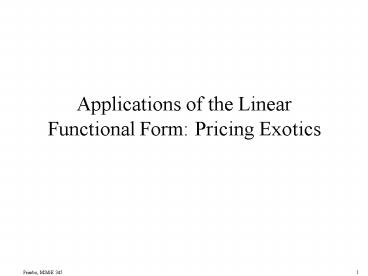Applications of the Linear Functional Form: Pricing Exotics
1 / 35
Title:
Applications of the Linear Functional Form: Pricing Exotics
Description:
Asians. Barrier. Lookbacks. American Digitals. Black Scholes. Dividends. Early cash flows ... Normally, we do not have closed form solutions for Asian options. ... – PowerPoint PPT presentation
Number of Views:66
Avg rating:3.0/5.0
Title: Applications of the Linear Functional Form: Pricing Exotics
1
Applications of the Linear Functional Form
Pricing Exotics
2
Black Scholes
Dividends
Early cash flows
Digitals
Asians
Exotics
Barrier
Lookbacks
American Digitals
3
The Black-Scholes formula
This time we use risk neutral pricing for a
European call option
Basically, we just have to calculate the
expectation by brute force!
4
The Black-Scholes formula
5
The Black-Scholes formula
6
The Black-Scholes formula
This looks like a Gaussian with mean sT.
7
The Black-Scholes formula
8
Question
Where does the Black-Scholes partial differential
equation come from in this framework????
The Black-Scholes pde!
9
Black Scholes
Dividends
Early cash flows
Digitals
Asians
Exotics
Barrier
Lookbacks
American Digitals
10
Continuous dividends
If the stock pays a continuous dividend at rate q
then
That is, the price of the stock has mean return
(r-q).
11
Continuous dividends
Hence, we could compute the price of a European
call option as
12
Black Scholes
Dividends
Early cash flows
Digitals
Asians
Exotics
Barrier
Lookbacks
American Digitals
13
What do we do with early cash flows Reinvest in
the bond!
We can use our pricing formula at time T
t 0
t 1
t 2
t 3
t 4
t 5
t 6
14
Early cash flows are just discounted from the
time they occur.
This makes sense, because there was nothing
particularly special about the time we called T.
Furthermore, if we hold an asset, we could decide
to sell it at any time of our choosing, and not
wait until a specified expiration or maturity
date. Our pricing formula must hold no matter
what time we decide to sell, otherwise we could
arbitrage by selling at smart times...
15
Black Scholes
Dividends
Early cash flows
Digitals
Asians
Exotics
Barrier
Lookbacks
American Digitals
16
European Digital (Binary) Option
Cash or nothing call
17
European Digital (Binary) Option
Asset or nothing call
payoff
K
K
ST
18
Notes
It should be clear that a standard European call
option is a portfolio of 1 asset-or-nothing call
and K cash-or-nothing calls.
One difficulty with digital options is that they
have discontinuous payoffs.
Theoretically, this is not a problem. However,
in practice it can make hedging these options
very difficult and risky.
19
Black Scholes
Dividends
Early cash flows
Digitals
Asians
Exotics
Barrier
Lookbacks
American Digitals
20
Asian Options
Recall that Asian options involve averages.
Normally, we do not have closed form solutions
for Asian options. The exception is when the
option is on a geometric average
so IT is actually log-normally distributed!
21
If we can calculate the mean and variance of then
we know everything about IT.
22
If we can calculate the mean and variance of then
we know everything about IT.
Variance
23
If we can calculate the mean and variance of then
we know everything about IT.
Variance
s
T
by symmetry
t gt s
T
t
24
If we can calculate the mean and variance of then
we know everything about IT.
25
Arithmetic Asian Options
In this case, IT, is not log-normally
distributed, and hence we cannot fit it into the
Black-Scholes formula framework.
However, it is common to compute the first two
moments of IT and assume that its distribution
is log-normal with the same first two moments.
In this case, the Black-Scholes formula provides
a quick and closed form approximation to the true
price.
This is sometimes referred to as the method of
moments in pricing.
26
Black Scholes
Dividends
Early cash flows
Digitals
Asians
Exotics
Barrier
Lookbacks
American Digitals
27
Barrier Options
Barrier options are like normal European options,
except that they are either activated, or become
worthless when the underlying asset hits a
pre-specified barrier.
The basic types are
Also, the barrier can be hit on the way down
(down-and-out, down-and-in) or it can be hit on
the way up (up-and-out, up-and-in).
28
Lookback Options
max
time 0
time T
Lookback options depend on the maximum or minimum
price achieved during the life of the option.
To price these, we need to be able to compute the
statistics of the maximum and minimum...
29
American Digitals
1
K
time 0
time T
American digital options payoff 1 the moment the
strike price is hit.
To evaluate this, we need to know the statistics
of the hitting time...
30
The statistics that I need to know for Barriers,
Lookbacks, and American digitals are all related
(Densities can then be obtained by
differentiation)
31
The Reflection Principle
The key trick here is the reflection principle.
x
For every path that crosses the barrier but ends
up below the barrier, there is a reflected path
that ends up above the barrier.
The only twist that we have to deal with is that
the probability of the original path and
reflected path may be different. However, if we
start with Brownian motion, we dont have this
problem.
32
The reflection principle for Brownian motion
B
time 0
time T
B
time 0
time T
33
The reflection principle for Brownian motion with
drift
B
time 0
time T
34
In a similar manner
etc...
These provide the building blocks for closed form
solutions...
35
The calculations become quite messy, so I wont
go through them
The main points are
There are closed form solutions for many barriers
and lookbacks. American digitals almost have a
closed form solution (you need to evaluate an
integral by quadrature).
These are a consequence of risk neutral pricing
combined with the reflection principle.
For some options, risk neutral pricing provides
the most direct route to closed form solutions.
Consult a good text (such as Hull) for the messy
formulas...































